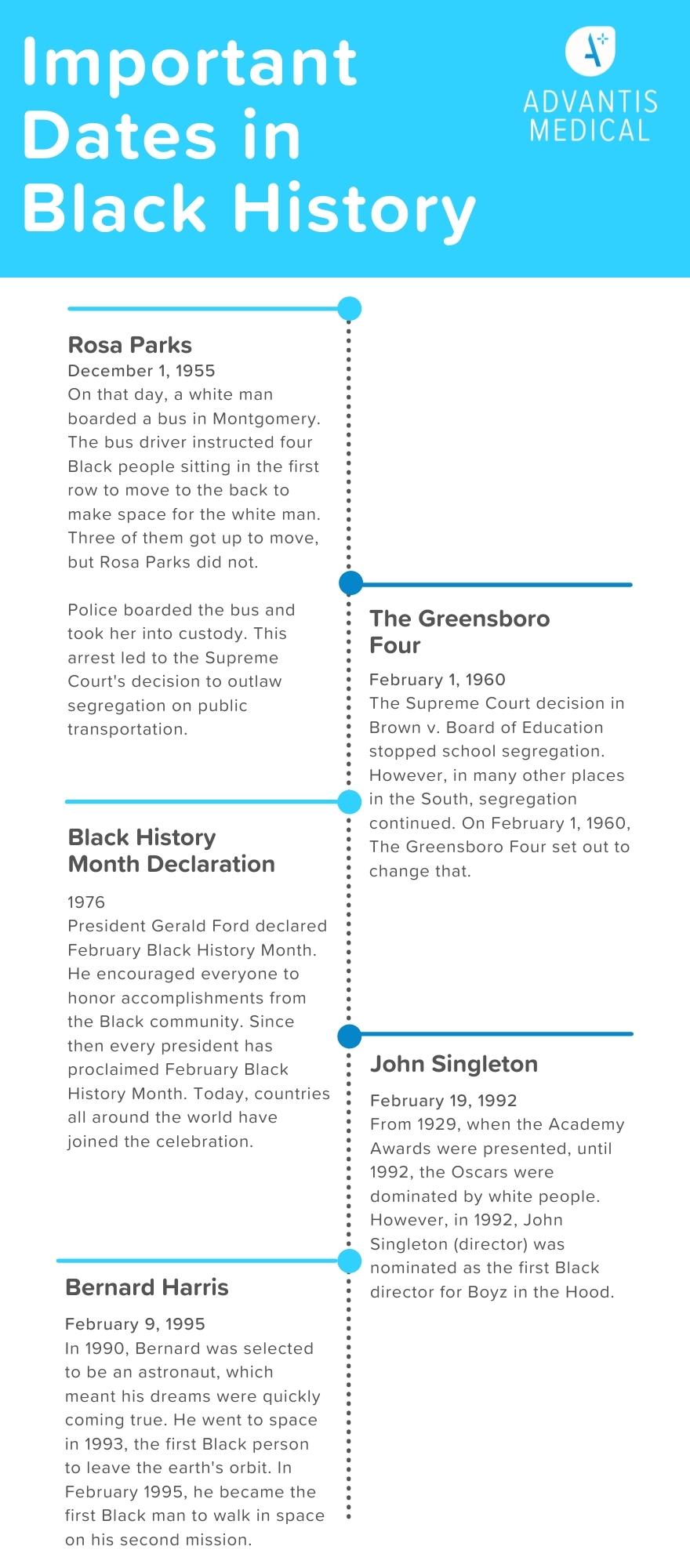Every February, we celebrate the history and achievements of the Black community. Black History Month is an important cultural celebration and a great learning opportunity. Throughout the country there are exciting Black History Month events to recognize Black excellence. In this article, we will explain why Black History Month should be celebrated and examine several Black History month important dates and heroes.
Why Should Black History Month be Celebrated?
Black History Month is celebrated worldwide. This month highlights overlooked achievements and encourages us to better our communities. Here are three reasons to set aside time to participate in Black History Month:
- Promotes Diversity– By celebrating Black History Month events and diversity, we’re not just recognizing Black achievements. We’re retelling powerful stories in a way that highlights how Black leaders impacted our lives.
- Brings Us Together– By celebrating Black leaders and important Black History important dates, we learn from and enjoy the success of others. We see how those differences can unite us and build stronger communities.
- Introduces Historical Figures– Traditional education often leaves out Black leaders and visionaries. To learn beyond the standard curriculum, we can use this month to learn about Black historical figures that transformed our lives and Black History month important dates.
By learning why we should celebrate Black History Month, we can plan Black Month history events and story-sharing seminars to become citizens.
How Black History Month Started
In 1976, President Gerald Ford declared February Black History Month. He encouraged everyone to honor the accomplishments and contributions of the Black community. Today, Black History Month is celebrated by countries across the globe with festive Black History Month events and educational experiences.
Black History Month Important Dates

Black History Month Important Dates: The Greensboro Four- February 1, 1960
In 1954, the Supreme Court decision in Brown v. Board of Education stopped school segregation. However, in many other places in the South, segregation continued. On February 1, 1960, The Greensboro Four set out to change that.
These four African American men studied at North Carolina Agricultural and Technical College. They sat down at Woolworth’s lunch counter, where only white people were allowed. Crowds of angry white men harassed these four men, who sat peacefully and returned day after day.
By March, this movement spread to 55 cities in 13 states. The result was that many diners were fully desegregated by the summer of 1960. When Woolworth’s finally followed suit, the four Black employees who had never gotten to eat at the restaurant where they worked were now the first ones served.
Black History Month Important Dates: Rosa Parks- December 1, 1955
Rosa Parks was born in Tuskegee, Alabama, on February 4, 1913. On December 1, 1955, she took action to capture national attention. This is just one of Black History Month important dates.
On that day, a white man boarded a bus in Montgomery. The bus driver instructed four Black people sitting in the first row to move to the back to make space for the white man. Three of them got up to move, but Rosa Parks did not.
Police boarded the bus and took her into custody. This arrest led to the Supreme Court’s decision to outlaw segregation on public transportation.
Black History Month Important Dates: Bernard Harris- February 9, 1955
In 1969, the Apollo 11 mission was televised, which inspired many people to become astronauts. One of those people was Bernard Harris, 13 years old, at the time.
In 1990, Bernard was selected to be an astronaut, which meant his dreams were quickly coming true. He went to space in 1993, the first Black person to leave the earth’s orbit. In February 1995, he became the first Black man to walk in space on his second mission.
Black History Month Important Dates: John Singleton- February 19, 1992
From 1929, when the Academy Awards were presented, until 1992, the Oscars were dominated by white people. However, in 1992, John Singleton (director) was nominated as the first Black director for Boyz in the Hood.
At that time, Black actors/actresses had been nominated and even won awards, but there were few opportunities for filmmakers/directors. This nomination changed things. Now, February 19th, 1992, has become an important date in Black History Month for the film and creative industry.
Evolution of Black History Month
Black History Month originated from Negro History Week in 1926, established by historian Carter G. Woodson. This week-long celebration was placed in the second week of February to coincide with the birthdays of two pivotal figures in American history: Abraham Lincoln and Frederick Douglass. These Black History Month important dates were chosen to honor work against slavery and for African American rights.
As the Civil Rights Movement grew in the 1960s, there was a need to expand the celebration. The achievements and contributions from the Black Community were too significant to be contained in one week. This led to Negro History Week expanding to become Black History Month.
In 1976, President Gerald Ford officially declared Black History Month. He urged Americans to “seize the opportunity to honor the too often overlooked achievements of Black Americans in every area of endeavor throughout our history.”
National Recognition of Black History Month
Black History Month has been essential in highlighting the accomplishments and contributions of the Black community. Since 1976, U.S. Presidents have issued an annual proclamation endorsing the theme set by the Association for the Study of African American Life and History (ASALH).
Founded in 1915 by Carter G. Woodson, the ASALH has been pivotal in advancing African American history and culture’s study, preservation, and celebration.
These proclamations shine a light on the impact African Americans have made throughout our nation’s history. By endorsing the themes set by ASALH, they inspire schools, organizations, and communities to come together and celebrate the achievements of the Black community.
This national recognition of Black History Month important dates honors the heroes and their contributions and preserves their story by pushing back against the historical erasure of their accomplishments.
Honoring the Legacy of Black History Month
Black History Month is a tribute to African Americans’ history, culture, and contributions. What began as Negro History Week has grown into a month-long celebration of Black History Month important dates and historical figures, providing a platform to recognize the journey, struggles, and achievements of Black Americans throughout history.
As we move forward, we remember the resilience and determination of those who came before us. Their legacy inspires us to continue the pursuit of equality and justice, ensuring future generations carry forward the torch of progress and hope.
A Travel Nurse Agency That Truly Cares
We take great pride in supporting travel nurses with more than just top travel nursing jobs—we’re building trusted, long-term partnerships that make your journey smoother, more rewarding, and stress-free. With over 700 5-star reviews and dozens of real nurse testimonials sharing their experiences, we’ve earned our reputation as the #1 travel nurse agency.
Our Advantis Gold Standard ensures you receive personalized support, exclusive travel job opportunities, and a level of care designed to put you first. Whether you want one-on-one guidance from a Pro Recruiter or prefer to explore travel jobs on your own, we’re here to make it easy. Start your next adventure today—explore high-paying travel nurse jobs and discover what’s possible!
FAQs – Black History Month Important Dates
1. What are the most significant Black History Month important dates to remember?
Black History Month important dates include February 1, 1960 (Greensboro Four sit-in), December 1, 1955 (Rosa Parks’ stand against segregation), February 9, 1995 (Bernard Harris’s historic spacewalk), and February 19, 1992 (John Singleton’s Oscar nomination as first Black director).
2. How did Black History Month begin?
Black History Month began as Negro History Week in 1926, established by historian Carter G. Woodson. It was officially expanded to a month-long celebration in 1976 when President Gerald Ford recognized February as Black History Month to honor the contributions of African Americans.
3. Why is February designated as Black History Month?
February was chosen for Black History Month because it coincides with the birthdays of two influential figures: Abraham Lincoln (February 12) and Frederick Douglass (February 14), both of whom played crucial roles in shaping Black history in America.
4. What types of Black History Month events are typically held nationwide?
Black History Month events include educational seminars, cultural exhibitions, film screenings, community discussions, musical performances, art shows, and story-sharing workshops that highlight Black excellence and contributions throughout American history.
5. How can I organize meaningful Black History Month events in my community?
To organize meaningful Black History Month events, consider hosting educational workshops, inviting local Black historians or community leaders as speakers, organizing book discussions featuring Black authors, arranging film screenings that highlight Black stories, or creating interactive exhibitions that showcase Black History Month important dates and achievements throughout history.
6. Why should we continue to celebrate Black History Month?
We should continue to celebrate Black History Month because it promotes diversity, brings communities together, introduces overlooked historical figures annd Black History Month important dates, counters historical erasure, acknowledges important contributions to society, and inspires future generations by highlighting the resilience and achievements of Black Americans throughout history.









